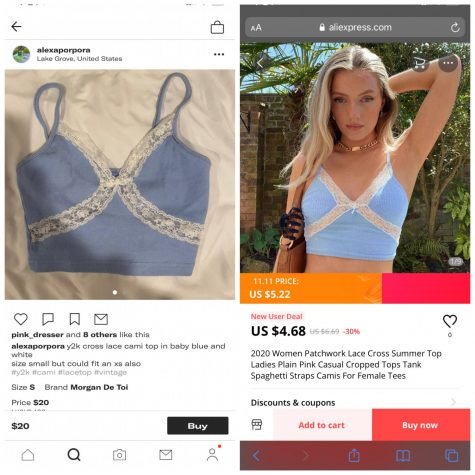Depop: Weighing the Pros and Cons
Depop, an app for buying and selling clothes, jewelry, and other small items, has gained much popularity since 2015, when there were over 10 million users. Now, in 2023, there are 3.3 million active buyers, 1.8 million active sellers, and over 30 million users overall. Being so popular, there has been some backlash on the choices some of the users on the app have been making. After talking to some Depop users, they have also noticed some positives and negatives to the app and how people are using it.
Pros of Depop:
As Depop is available to anyone who can access the app, it is a very efficient and easy way to sell different items. You are able to sell things you are not using anymore to not only get money, but to recycle and help the environment as well. Your unwanted items could be someone's treasure!
One of my friends, Zeiah Carrang, has shared with me that she loves how easy and ethical it is to buy and sell on Depop. “A pro is having the ability to sell a lot of almost anything… with it reaching the right buyer. I’ve sold almost forty items with them mostly being clothes, and I really like the platform that Depop allows me to sell on. Especially for people who have never used Depop before… it is very easy to use to buy and sell.”
Another plus is being able to sell handmade items, share your creativity with others, and start your small business by selling items like accessories, clothes, or other small trinkets. I have followed many handmade jewelry and clothing shops on the app and love how unique the designs are. It gives a great headstart to their future business, if they are planning to expand it, and allows practice for what a future business could be like. Some of my favorite sellers on the app who sell their handmade creations are @devoscloset, @tatumarray, @strawberi04, and @briannagabrielaa. Not only are you supporting small businesses, but you are wearing a really unique piece you won’t see most people wearing!
Cons of Depop:
Although there are many pros, there has been just as much criticism of the app. I asked another one of my friends, Macie Martino, a Depop buyer and seller, what she has noticed. “A lot of people go to thrift stores buying in bulk which makes it less accessible for lower income families. Therefore, people in these communities have a harder time finding affordable trendy clothes and are left with the less stylish items.”
Over the past few years I’ve been using Depop, I also have noticed this behavior on the app. I think it is one thing to find something rare in the thrift store to sell for a higher price, as you see value in it, but it becomes an issue when a seller is buying all of the trendy, high demand items. Although it does not break any technical rules when buying from thrift stores, since shopping at thrift stores is first come first serve, it makes it harder for people to find rare items and even increases prices in thrift stores. Many sellers will buy these rare items in the kids’ sections or in plus sizes (which are more sought-after) and sell them for almost triple the price.
Image Source: Stella Hofferman
Many of these items are able to sell for such expensive prices due to the tags these sellers use on their products. For example, a seller could sell a regular kids’ t-shirt, label it as a “y2k baby tee,” and sell it for $30. Because these words appeal to current trends, sellers are able to make a big profit, which not only causes them to sell more, but inspires others to make similar business decisions. Other common tags are “cottagecore”, “coquette”, “90s”, etc.
Not only do many sellers raise the costs of thrifted pieces to outrageous prices, but some will buy things on Aliexpress or Shein, not disclosing the brand, for those same high prices. This completely defeats the purpose of buying and selling sustainably.
After comparing the pros and cons of using Depop, I would say that it is a great way for beginners to start selling different items sustainably. However, because of the choices made by different sellers, there are cons, such as charging unfairly high prices on items from thrift stores or cheap fast fashion companies. Next time you are using the app, be sure to consider the pros and cons to keep Depop a trustworthy spot!
Written by Kara Haas
Kara is a high school student who is an aspiring writer. She is hoping to study journalism in college to write about the fashion industry in the future. As well as having a passion for writing, Kara also loves to study fashion and try new, different looks out of her comfort zone. In her free time she loves baking, trying new makeup looks, and watching cartoons.


